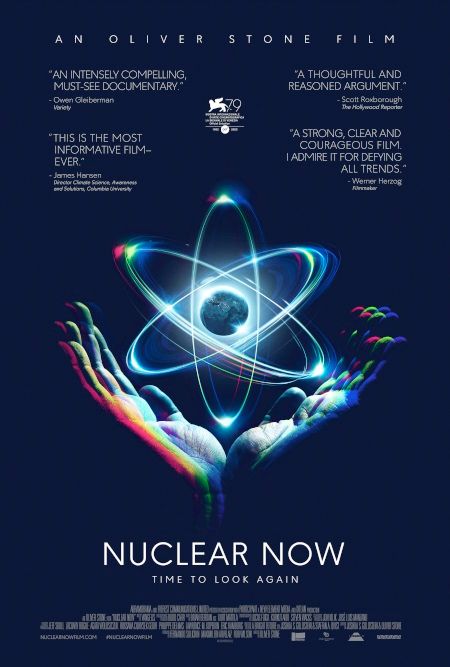I went to see Oliver Stone's new polemic/documentary, Nuclear Now, earlier this week. It screened here one time on Monday night and doesn't appear to have any further showings lined-up here in Madison.
Stylistically, it took the newsreel aesthetic from The Untold History of the United States and merged it with his interview style from Comandante and others. Stone is narrator and interlocutor here. Like some of his other documentaries, Stone uses his casual intonation here and comes across less as an omniscient narrator and more like a guy you're chatting with at the bar.
Early on, Stone admits he used to be anti-nuclear power but changed his mind in light of the threat posed by climate change and by learning more about the subject. He proceeds to give a little history of the technology before chronicling how it fell out of favor, with many people developing an irrational phobia for it, thinking that another Three Mile Island or Chernobyl was just around the corner.
The crux of the argument here is that nuclear power does not generate greenhouse gases and that renewables such as solar, wind, and hydropower just cannot satisfy the ever-growing demand for electricity. While electricity demand in the United States is basically stagnant, it is skyrocketing in China and India as their societies modernize.
In one sequence, Stone laments how Germany is disbanding/has disbanded its nuclear power industry but the massive arrays of solar panels that have been erected in its stead have not been able to produce enough electricity to prevent a reliance on coal.
In another, he seeks to overthrow the myths surrounding Three Mile Island and the disaster at the Fukushima nuclear power plant. Stone waves these aside noting that the dangers were contained and no one was seriously harmed. Furthermore, problems at nuclear power plants arise from poor design. For example, the sea walls at Fukushima were too short and the backup generators that could have kicked in and prevented further destruction were placed too low and were flooded.
Cherobyl, he admits, was a real disaster that lead to many deaths. But poor design and hubris on the part of the scientists there lead to the meltdown and the Soviet response was lackluster, at best.
Stone urges the viewer to instead look to France which produces most of its electricity from nuclear power and does things right. I.e. - no disasters.
I went into the theater agreeing with Stone that nuclear power was a necessary tool in the fight to moderate the effects of climate change. Anyone not yet convinced was given a whirlwind argument for the affirmative with a lot of history and statistics thrown at you in fairly rapid succession. Stone often throws out a statistic which was usually illustrated by a colorful bar graph, and then quickly moved on to his next point. This movie is definitely aimed at the everyperson but it does move along at a clip and it's a real infodump in many spots.
The most interesting parts to me were the history, both of nuclear power in general as well as of what exactly happened with the most notorious reactor problems, and the looks at the state of the technology. China is apparently investing heavily in it and has various designs they're pursuing, including very small reactors. Stone also speaks with a duo here in the States looking to create smaller reactors that would serve somewhere on the order of 1,000 households.
I was flabbergasted at how much electricity we use and how much coal is burned to generate it. I don't recall the exact numbers but they're staggering.
The was one scene where I found myself be slightly annoyed that Stone hadn't phrased something the way I would have. He was basically saying that individual decisions weren't enough. Switching all of your bulbs to LED wasn't going to solve global climate change. It was a sentiment I agreed with but I felt it let people off lightly, no pun intended. He phrased his narration in a way that gave the impression that nuclear power was a license to be as profligate as you can be with the Earth's resources. You can have a TV in literally every room in your house with no guilt; everyone in your household can have a car; you can keep your house at 85 in the winter and 65 in the summer. Buy more stuff! The power to make and run it all is carbon-free!
While I concede that adjusting your thermostat a couple of degrees isn't
going to solve climate change and I don't want to sound all Marcusian,
but I can't help but think that the world would be better off if people
in developed nations used less. Of everything.
I suppose I am deviating from the topic of global climate change here. But I recently watched a video by a German woman living in America. In it she noted that Germans find the car-centric culture of America weird. We drive short distances that Germans would be inclined to walk and we have drive-thrus for so many things. So your car may run on clean energy, but you're driving 3 blocks to the McDonald's drive thru and then 500' across the street to Dairy Queen's.
And your car may run on clean energy on that drive to Walmart where you buy those cheap widgets from China (and your diabetes medication), but those things are still going to end up in the landfill. Or in the ocean, I suppose.
Nuclear Now does a good job of laying out the case for nuclear power. The question is how do we throw off the shackles of coal and move to this cleaner energy. Stone leaves that answer to us.

No comments:
Post a Comment